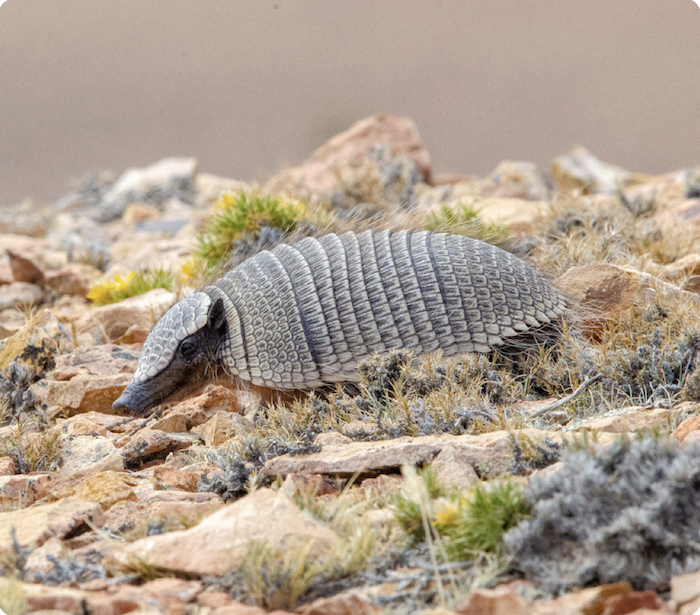“A la Trace”, French version
“On the Trail”, English version
Quarterly information and analysis report on endangered animals poaching and smuggling
No. 44
1,545 events
between January 1 and March 31, 2024
1,184 sources, 244 pages, 7.2 MB
 Pichi also called pygmy armadillo (Zaedyus pichiy) © Francisco Gambino (CC BY-NC).
Pichi also called pygmy armadillo (Zaedyus pichiy) © Francisco Gambino (CC BY-NC).
The Secretariat of the Washington Convention on international trade in endangered species of wild fauna and flora, known as CITES, recognises the usefulness of a possible annual report on the volume and diversity of the illegal trade, but its implementation has been postponed due to a lack of financial resources and the pilot project resembles a failed attempt and a disappointed hope.
With 7 employees working on “On the Trail” and with modest finances fortunately consolidated by the Fondation Franz Weber, the Fondation Brigitte Bardot and the Séché Environnement group, the French NGO Robin des Bois is replacing the 184 signatory countries of CITES and since 2013 has been publishing a quarterly report on the poaching and smuggling of all animal species that are endangered today and those that may be endangered in the future.
Beyond an overview of the defaunation and destruction of habitats, “On the Trail” describes the mechanics of the pillaging and appropriation of terrestrial, marine and aquatic biodiversity and the wheels of cross-border crime in conspiracy.
In circuits several thousand kilometres long, the networks of poaching, grouping, transport and smuggling are compartmentalised. Each one has their own pain, risk, profit or punishment. The final destination at the start and the exact origin at the end are unknown.
In the short circuits of a few hundred kilometres, there are fewer links and the traffic expands or contracts according to seasonality and opportunities. Before Lent in Latin America, during Holy Week and at Easter, there are numerous seizures of turtles, caimans, iguana eggs, armadillo and paca meat at stations and roadside checks.
There are several similarities between the drug smuggling networks and the wildlife or wildlife parts smuggling networks and they are sometimes confused. In 2016, “On the Trail” no. 14 (p. 8 ref. 4) spotted a shipment of frozen sharks and 500 kg of cocaine in the same fishing boat off the coast of South America in the Pacific Ocean. In November 2023, the Colombian Navy stopped a fishing boat and seized 550 kg of cocaine and 3 howler monkeys on board, further proof that drug trafficking and wildlife trafficking go hand in hand (“On the Trail” no. 43, p.66 ref. 17). In the European Union, including France, seizures of narcotics from wildlife traffickers and seizures of wildlife from narcotics traffickers are on the increase. “Narcotism” goes hand in hand with “mascotism” (from “mascotismo”, used in Spanish-speaking countries to refer to the trafficking of wild animals as pets).
“On the Trail” has no qualms about disclosing the financial estimates of customs and tax services on the trafficking of glass eels, totoaba swim bladders, pangolin scales or feline skins. Robin des Bois believes that poachers and smuggling rings have other means than reading “On the Trail” to assess the real and speculative value of live or dead wild animals and parts. For the last five years, the countries of East and Southern Africa have frozen the official price of a kilogram of elephant ivory at less than 2,000 US$ and that of rhino horn at less than 10,000 US$. These quotes, intended as a deterrent, do not prevent the poaching of pachyderms and the trafficking of both materials (ivory and rhino horn) from continuing and developing by sea and air, including in the European Union; on March 27, 2024, a parcel departing from Lisbon (Portugal) and bound for Paris was found to contain 7 kg of rhino horn.
In their nets, Indian and Chinese customs are collecting shipments and packages with misleading and colourful names. Live beetles are declared “Christmas decorations”, millions of peacock feathers “door mats made up of coir” and sperm whale teeth “wooden toys,”.
Sometimes the arrests are echoing and countering current news. In Germany, a group of Russian and Ukrainian teenagers got together “for fun” over the weekend to steal a lion-tailed macaque from Leipzig Zoo.
There is cause for outrage in “On the Trail” and there is cause for hope.
Wolves: the Wall of Shame
Wall of Hope
 Imprimer cet article
Imprimer cet article











